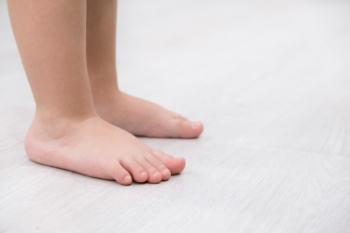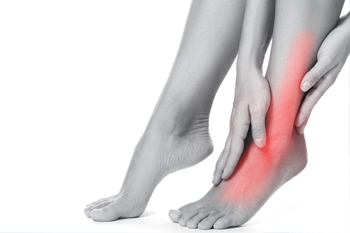
Obesity is a prevalent health concern worldwide that not only affects overall well-being but also exerts a significant impact on foot health. The excess weight carried by individuals with obesity places immense pressure and strain on the feet, leading to various musculoskeletal issues. Foot conditions worsened by obesity include plantar fasciitis, flat feet, and osteoarthritis. The arches of the feet may collapse under the weight, causing pain and discomfort, while the increased force on joints can accelerate the degenerative process. Furthermore, obesity contributes to the development of conditions like diabetic neuropathy and peripheral artery disease. This further compromises foot health and increases the risk of complications such as ulcers and infections. Managing obesity through lifestyle modifications, including diet and exercise, plays a vital role in alleviating foot discomfort and preventing long-term complications. If you are overweight and are experiencing foot conditions, it is suggested that you confer with a podiatrist who can treat foot pain and offer you weight management tips.
The more you weigh, the harder your feet must work to support your body. If you’re an obese individual and are concerned about your feet, contact one of our podiatrists from Piedmont Podiatry Associates. Our doctors can provide the care you need to keep you pain-free and on your feet.
Obesity and Your Feet
People who are overweight are putting more pressure on their ankles, knees, and hips as well as their feet. This unfortunately can lead to variety of different issues.
Problems & Complications Stemming from Obesity
- When the body is overweight, it tries to compensate by changing the way that it moves. An obese person may lean forward and put extra weight on the wrong part of the foot. This puts unnecessary stress on the feet.
- Obese people are also more likely to develop type II diabetes which is a condition that causes a lot of foot problems. People with diabetes often don’t feel the cuts and sores that they may have on their feet, which can lead to more complicated and severe issues.
- Plantar fasciitis is another foot condition that can be caused by obesity. Plantar fasciitis is an inflammation of the tissue along the bottom of the foot, which causes pain and stiffness while walking and climbing stairs.
If you have any questions, please feel free to contact one of our offices located in Greenville, and Easley, SC . We offer the newest diagnostic and treatment technologies for all your foot care needs.

Flat feet, also known as fallen arches, are a common condition where the arches of the feet touch the ground when standing. While it is normal for babies and toddlers to have flat feet due to underdeveloped arches, most children develop arches by the age of six. However, some children continue to have flat feet into adolescence and adulthood. In many cases, flat feet do not cause any problems or require treatment, although some children may experience foot pain, stiffness, or difficulty with activities like running or sports. It is important for parents to monitor their child's foot development and seek medical attention if they have concerns about flat feet. A podiatrist can assess the child's feet and recommend appropriate interventions, such as wearing supportive footwear or custom orthotic inserts. By understanding flat feet and seeking timely intervention when needed, parents can help ensure their child's foot health and overall well-being. If your child has maintained flat feet beyond the age of six, it is strongly suggested that you confer with a podiatrist who can monitor your child’s condition.
Flatfoot is a condition many people suffer from. If you have flat feet, contact one of our podiatrists from Piedmont Podiatry Associates. Our doctors will treat your foot and ankle needs.
What Are Flat Feet?
Flatfoot is a condition in which the arch of the foot is depressed and the sole of the foot is almost completely in contact with the ground. About 20-30% of the population generally has flat feet because their arches never formed during growth.
Conditions & Problems:
Having flat feet makes it difficult to run or walk because of the stress placed on the ankles.
Alignment – The general alignment of your legs can be disrupted, because the ankles move inward which can cause major discomfort.
Knees – If you have complications with your knees, flat feet can be a contributor to arthritis in that area.
Symptoms
- Pain around the heel or arch area
- Trouble standing on the tip toe
- Swelling around the inside of the ankle
- Flat look to one or both feet
- Having your shoes feel uneven when worn
Treatment
If you are experiencing pain and stress on the foot you may weaken the posterior tibial tendon, which runs around the inside of the ankle.
If you have any questions please feel free to contact one of our offices located in Greenville, and Easley, SC . We offer the newest diagnostic and treatment technologies for all your foot and ankle needs.

Foot pain, a pervasive issue affecting individuals of all ages, warrants a comprehensive understanding to address its diverse origins and alleviate discomfort. Defined as discomfort or soreness experienced anywhere in the foot, foot pain can stem from a multitude of factors. Common causes include biomechanical issues such as flat feet, high arches, or abnormal gait patterns, which place undue stress on the feet. Additionally, injuries like sprains, strains, or fractures, whether from sports activities or accidents, contribute to foot pain. Footwear choices play a significant role, with ill-fitting shoes, high heels, or worn-out footwear exacerbating discomfort. Furthermore, medical conditions such as arthritis, plantar fasciitis, neuropathy, and tendonitis can manifest as persistent foot pain. Lifestyle factors like obesity, poor posture, and occupational demands also impact foot health. If you are experiencing any type of foot pain, it is strongly suggested that you seek the guidance of a podiatrist who can accurately diagnose and offer a treatment plan that is right for you.
Foot Pain
Foot pain can be extremely painful and debilitating. If you have a foot pain, consult with one of our podiatrists from Piedmont Podiatry Associates. Our doctors will assess your condition and provide you with quality foot and ankle treatment.
Causes
Foot pain is a very broad condition that could be caused by one or more ailments. The most common include:
- Bunions
- Hammertoes
- Plantar Fasciitis
- Bone Spurs
- Corns
- Tarsal Tunnel Syndrome
- Ingrown Toenails
- Arthritis (such as Gout, Rheumatoid, and Osteoarthritis)
- Flat Feet
- Injury (from stress fractures, broken toe, foot, ankle, Achilles tendon ruptures, and sprains)
- And more
Diagnosis
To figure out the cause of foot pain, podiatrists utilize several different methods. This can range from simple visual inspections and sensation tests to X-rays and MRI scans. Prior medical history, family medical history, and any recent physical traumatic events will all be taken into consideration for a proper diagnosis.
Treatment
Treatment depends upon the cause of the foot pain. Whether it is resting, staying off the foot, or having surgery; podiatrists have a number of treatment options available for foot pain.
If you have any questions, please feel free to contact one of our offices located in Greenville, and Easley, SC . We offer the newest diagnostic and treatment technologies for all your foot care needs.









